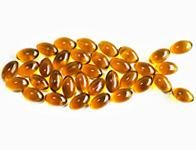Written by Greg Arnold, DC CSCS. Those who supplemented daily with 1200 mg of Omega-3 fatty acids for 6 months had significant improvements in BCAT (a mental aptitude test) scores, specifically in working memory, perceptual space, and space imagery efficiency.
 Cognitive impairment is a serious health issue that confronts elderly people, with Alzheimer’s disease costing our healthcare system more than $210 billion 1. Mild cognitive impairment is an “intermediate stage” in the progression to full-blown dementia-like Alzheimer’s disease. Fortunately, research is now identifying ways to slow the progression of cognitive impairment. These include a Mediterranean Diet 2 and supplementation such as 25 mg per kilogram of bodyweight of magnesium 3.
Cognitive impairment is a serious health issue that confronts elderly people, with Alzheimer’s disease costing our healthcare system more than $210 billion 1. Mild cognitive impairment is an “intermediate stage” in the progression to full-blown dementia-like Alzheimer’s disease. Fortunately, research is now identifying ways to slow the progression of cognitive impairment. These include a Mediterranean Diet 2 and supplementation such as 25 mg per kilogram of bodyweight of magnesium 3.
A 2017 study out of China 4 involved 86 elderly Chinese subjects (51 men, 35 women) between the ages of 64 and 76 who were diagnosed with “mild cognitive impairment” (as established in previous research 5. They were given either 1,200 mg of omega-3 fatty acids per day (480 mg DHA and 720 mg EPA = 44 subjects) or placebo (olive oil = 42 subjects) for 6 months. Blood samples were taken before and after the study. The researchers assessed cognitive impairment by having each subject complete the Basic Cognitive Aptitude Test (BCAT). This test measures perceptual speed, mental arithmetic efficiency, space imagery efficiency, working memory, and recognition memory.
Across the entire aptitude test, those in the omega-3 group had a statistically significant improvement compared to the placebo group (p < 0.0001). Specifically, there was a 43.5% improvement in their BCAT score (31.16 to 44.73, p < 0.05) compared to a 12% increase in the placebo group, which did not reach statistical significance (33.17 to 37.17, p > 0.05).
When looking at specific areas of the aptitude test, omega-3 fats produced statistically significant improvements in three areas:
| Omega-3 | p-value | Placebo | p-value | p-value between groups |
|
|---|---|---|---|---|---|
| Perceptual Speed | 6.93% increase (5.22 to 8.84) | < 0.05 | 14.4% increase (5.62 to 6.43) | > 0.05 | 0.0002 |
| Space Imagery Efficiency | 52.6% increase (4.46 to 6.81) | < 0.05 | 0.1% decrease (6.29 to 6.28) | > 0.05 | 0.0002 |
| Working Memory | 62.2% increase (5.32 to 8.63) | < 0.05 | 25.2% increase (5.47 to 6.85) | > 0.05 | 0.0047 |
When suggesting a possible mechanism for how omega-3 supplementation improved cognitive performance, the researchers pointed to a significant improvement in inflammation levels. Increased inflammation levels have been shown to be a detriment to cognitive function 6:
| Omega-3 | p-value | Placebo | p-value | p-value between groups |
|
|---|---|---|---|---|---|
| IL-6 (picograms/milliliter) | 29% decrease (120.60 to 85.66) | < 0.05 | 9.7% decrease (120.90 to 109.26) | > 0.05 | 0.018 |
| TNF-alpha (fmol/mL) | 31.2% decrease (19.00 to 13.09) | < 0.05 | 10.2% decrease (17.17 to 15.43) | > 0.05 | 0.027 |
For the researchers, “omega-3 fatty acids can improve cognitive function in people with mild cognitive impairment” but that “Further studies with different fish oil dosages, longer intervention periods, and larger sample sizes should be investigated before definite recommendations can be made.”
Source: Bo et al. The n-3 Polyunsaturated Fatty Acids Supplementation Improved the Cognitive Function in Supplementation Improved the Cognitive Function in he Chinese Elderly with Mild Cognitive Impairment: A Double-Blind Randomized Controlled Trial. Nutrients 2017, 9, 54; doi:10.3390/nu9010054
© 2017 by the authors; licensee MDPI, Basel, Switzerland. Creative Commons Attribution (CC-BY) license (http://creativecommons.org/licenses/by/4.0/)
Click here to read the full text study.
Posted March 20, 2017.
Greg Arnold is a Chiropractic Physician practicing in Hauppauge, NY. You can contact Dr. Arnold directly by emailing him at PitchingDoc@msn.com or visiting his web site at www.PitchingDoc.com.
References:
- Association As. 2012 Alzheimer’s disease facts and figures. Alzheimer’s & Dementia. 2012;8(2):131-168.
- Valls-Pedret C, Sala-Vila A, Serra-Mir M, et al. Mediterranean diet and age-related cognitive decline: a randomized clinical trial. JAMA internal medicine. 2015;175(7):1094-1103.
- Liu G, Weinger JG, Lu Z-L, Xue F, Sadeghpour S. Efficacy and safety of MMFS-01, a synapse density enhancer, for treating cognitive impairment in older adults: a randomized, double-blind, placebo-controlled trial. Journal of Alzheimer’s Disease. 2016;49(4):971-990.
- Bo Y, Zhang X, Wang Y, et al. The n-3 Polyunsaturated Fatty Acids Supplementation Improved the Cognitive Function in the Chinese Elderly with Mild Cognitive Impairment: A Double-Blind Randomized Controlled Trial. Nutrients. 2017;9(1):54.
- Petersen RC, Smith GE, Waring SC, Ivnik RJ, Tangalos EG, Kokmen E. Mild cognitive impairment: clinical characterization and outcome. Archives of neurology. 1999;56(3):303-308.
- Glass CK, Saijo K, Winner B, Marchetto MC, Gage FH. Mechanisms underlying inflammation in neurodegeneration. Cell. 2010;140(6):918-934.
